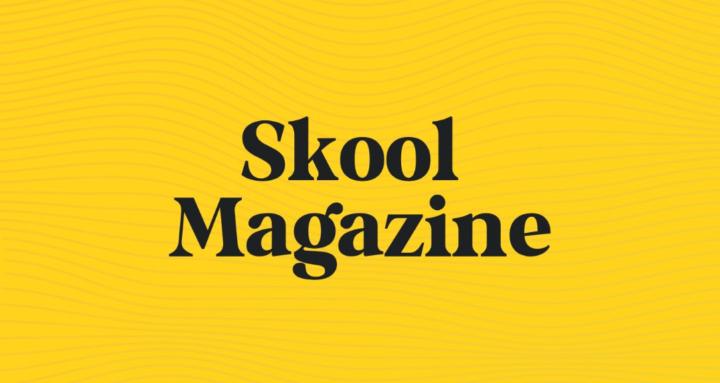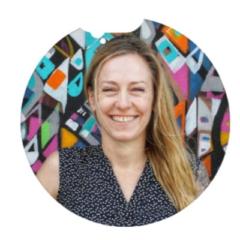🔥
Apr 9 • 🎙️ Podcasts
Breaking the Box: Sarah's Path to Building Authentic Communities on Skool
"Be human, online." This simple philosophy has guided Sarah to remarkable success on Skool, the innovative community platform founded by Sam Ovens that's rapidly changing how entrepreneurs connect with their audiences. Where many digital marketers hide behind polished personas and aggressive sales tactics, Sarah has embraced what she calls her "neuro-spicy" authentic self, creating thriving communities built on genuine connection rather than formulaic engagement strategies.
I recently sat down with Sarah to discuss the culture of Skool, effective community building strategies, and why being your authentic self online is not just personally fulfilling—but also the fastest path to monetization success in today's digital landscape.
Finding Your Authentic Space on Skool
When asked about what drew her to the Skool platform, Sarah's answer cut straight to the heart of what makes this community unique: "I started finding people that I resonated with—it wasn't just the people that had gone to business school. It wasn't just the pushy, bro marketing, hustle culture, sales tactics all over the place. I found people that were having fun doing business."
This culture of authenticity is what initially attracted Sarah to Skool and what continues to make the platform stand out for community builders seeking a different path to making money online. "Being able to be authentically me, because in a lot of areas for a lot of my life, I've held back," she explains. "Whether I was masking because I'm neuro-spicy or whatever, we're trained from when we're little to fit in. Here's your box! But I've been on a journey for the last several years to smash the damn box."
This commitment to authentic self-expression isn't just a personal preference—it's become central to Sarah's community building strategy on Skool. "When I can be authentically me and I can show other people that they can be authentically them, that's when the magic happens," she notes. "Because then they start energetically attracting their ideal client that they love to work with, and their clients love to work with them."
Engagement Through Messy Action
Sarah's approach to community building on Skool centers around what she calls "messy action"—a refreshing alternative to the polished, curated content that dominates many online spaces.
"I talk about messy action all the time. Not imperfect action, because that's a thing. And they mean kind of the same thing, right? But I'm messy," she admits with characteristic candor. This philosophy translates directly into how she approaches engagement on the platform.
"I jump in a place and I can drum up engagement because I like to get to know people, and I'm asking people questions," she explains. "It's not me standing on a platform with my bullhorn. Sure, I make posts sometimes, and yeah, I share my experience, but that's not the goal. I wanna know what makes this person tick, I wanna get curious about how they did something, I wanna keep asking questions."
This community-centered approach stands in stark contrast to the broadcast model that many bring from traditional social media. As Sarah points out, "If you're building community, you're having a party, and you're having friends over and getting to know each other. You're not standing up there with your bullhorn. You're asking them questions, taking a breath, wanting them to respond. It's a community and not an audience."
Overcoming Mindset Blocks to Monetization
When it comes to helping clients build successful communities on Skool, Sarah focuses on addressing the core mindset issues that prevent monetization—often before clients even recognize these blocks themselves.
She recounts a particularly striking success story: "One dude that I helped, he had a block and was trying to figure out what he wanted to start his community about. It wasn't about that. We did a lot of mindset work because the bulk of issues for anybody is mindset work."
Sarah's approach involves asking pointed questions to uncover these hidden barriers. "I asked him, 'Where is this coming from? Is it that you don't wanna ask people for money?' Because a lot of people have blocks around asking for money, especially people in the esoteric or health communities. There's this 'ick' feeling about asking for money."
The results of addressing these core blocks can be dramatic. "We had this conversation, and he went from not having a Skool community to pulling in 50K in sales within five months," Sarah reveals.
This highlights a critical insight for those looking to monetize on Skool: technical knowledge alone isn't enough if underlying mindset issues remain unaddressed. As Sarah puts it, "Human beings don't do things that don't serve us something. And what is safe for our biological being is what is known—even if it's painful and uncomfortable and we complain about it all the time."
Finding Your Authentic Voice and Ideal Client
One of the most refreshing aspects of Sarah's approach is her emphasis on embracing your full self rather than trying to fit a predetermined mold of how an online entrepreneur "should" be.
"I can be all of these things," she explains, recounting how someone once expressed confusion about her online presence. "You make these long, drawn-out, really thoughtful posts or comments, but then over here, you're leaving naughty GIFs and fun comments. I don't get it." Her response? "That's me. I can be all of these things. We're just not meant to fit ourselves into a box."
This authenticity extends to how Sarah helps clients identify and communicate with their ideal clients on Skool. Rather than using AI-generated ideal client avatars, she advocates for a more nuanced approach:
"Who is your ideal client? Are you going after somebody who's 20 or somebody who's in their forties or fifties? Their pain points, their ideal outcome, how they speak is going to be different," she explains. "Are you going after a newbie or somebody who's more experienced? You can start using acronyms if they've been in business for a while because a newbie's not gonna get what LTV is, or maybe not understand what 'churn' means."
Sarah also emphasizes the importance of intentionally repelling clients who aren't a good fit. "It's completely okay to put something in that repels the people that aren't your ideal client," she insists. "A lot of times, especially as newbies, we try to get everybody in. But when you try to get everybody, it doesn't work."
Making Money on Skool: Focus on Tangible Benefits
For those looking to monetize their knowledge on Skool, especially in areas like mindset or esoteric practices, Sarah offers pragmatic advice about framing offers in terms of tangible benefits.
"With the mindset kind of stuff or energetic modality, why do they want that? What's the tangible benefit of it?" she asks. Referring to Alex Hormozi's framework, she notes that people typically pay for help with "money, relationships, health and beauty."
Sarah's polling within Skool revealed this paradox: "I've done a poll in Skool, 'What do you need most help with? Copy, creatives, or mindset?' 70% said mindset, but those people aren't gonna pay for it. They're not going to because of societal programming that says, 'Oh, you should be able to do that yourself.'"
The solution? "If you give them the next step, like the benefit of the benefit—I'm gonna fix my mindset so that I can make more money—people will pay to help them make more money. People will pay you to help them snag a girlfriend or have a husband. They'll pay for that."
Collaboration Over Competition on Skool
One of the most distinctive aspects of the Skool platform, according to Sarah, is how it fosters collaboration rather than competition—even among community builders in similar niches.
"It doesn't matter if we're in the same niche," she explains. "We can cheer each other on. We can be like, 'Ah, man,' when something bad happens, or 'Let me help you.' It creates this community that I've never seen anywhere."
This abundance mindset extends to how different community builders can operate in the same space without feeling threatened. "The way that Ryan does things is different than the way that Goose does things is different than the way that I do things is different than the way Calvin does things," Sarah notes. "We have similarities, but we do things differently. And we can be friends. It's so freaking amazing."
Starting Small but Thinking Long-Term
For those just beginning their Skool journey, Sarah offers counterintuitive advice about joining smaller communities rather than only focusing on the most popular ones.
"That drives me bananas about people in Skool—they don't wanna join groups that have a small amount of members. I'm like, why not? You basically get like one-on-one attention from the owner while they're building before they get big," she points out.
Similarly, she encourages new community builders to embrace incremental growth rather than trying to fulfill their entire vision immediately. "You're seeing the whole vision 20 years down the road. When I say you need to niche down to a specific thing with that specific benefit, it's so that you get that going. You can refine, evaluate, and refine again."
This long-term perspective is balanced with being fully present and open to unexpected opportunities. "Being able to not bring the past into the present... and also releasing my expectations of what's to happen in the future. Being fully present in the moment," Sarah explains.
"Before, I was like, 'This has to happen this way. I need to do this and this and this.' What you're doing is you're putting a ceiling on what can happen. When you decide, 'Oh, yes, this is what I would like to do,' but remain open to pivots—that's when you can truly grow."
Final Thoughts
Throughout our conversation, Sarah repeatedly returns to themes of authenticity, genuine engagement, and the courage to show up as your full self on Skool. In a digital landscape often dominated by formulaic approaches and carefully curated personas, her success offers a refreshing alternative focused on human connection.
"We came here with a passion and purpose," she concludes. "Whether you know what it is or not, you came here for a reason. You came here to live, to learn, and to do your thing. So the more that you can dip your toes—not everybody's gonna be like me, jumping full in—dipping your toe in is perfectly fine. Just move a little bit that way and see what happens."
For those looking to build thriving communities on Skool, Sarah's journey demonstrates that authenticity isn't just personally fulfilling—it's also good business. By embracing their unique voice, focusing on genuine engagement, and addressing the core mindset issues that block progress, community builders can create spaces where both they and their members can truly thrive.
10
1 comment

skool.com/magazine
Articles, videos, reviews, & podcasts from some of the coolest communities on Skool 😎
Powered by





